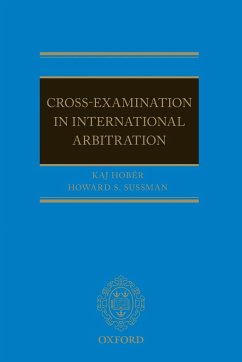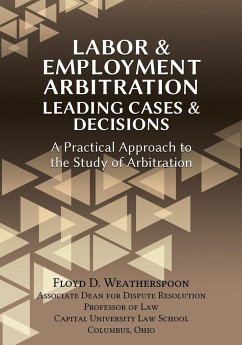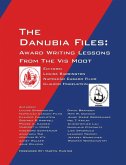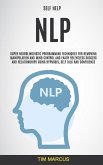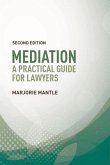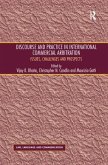- Broschiertes Buch
- Merkliste
- Auf die Merkliste
- Bewerten Bewerten
- Teilen
- Produkt teilen
- Produkterinnerung
- Produkterinnerung
A practical, self-teaching guide to effective cross-examination in international arbitration. Offers an introductory or quick-reference guide to essential cross-examination techniques and how they can best be best adapted to the arbitral format.
Andere Kunden interessierten sich auch für
![Labor & Employment Arbitration Labor & Employment Arbitration]() Floyd D. WeatherspoonLabor & Employment Arbitration107,99 €
Floyd D. WeatherspoonLabor & Employment Arbitration107,99 €![The Danubia Files The Danubia Files]() The Danubia Files42,99 €
The Danubia Files42,99 €![Soft Power Negotiation Skills Soft Power Negotiation Skills]() Ph. D Ida GreeneSoft Power Negotiation Skills18,99 €
Ph. D Ida GreeneSoft Power Negotiation Skills18,99 €![Research and Practice in International Commercial Arbitration Research and Practice in International Commercial Arbitration]() S I StrongResearch and Practice in International Commercial Arbitration78,99 €
S I StrongResearch and Practice in International Commercial Arbitration78,99 €![Self Help Self Help]() Tim MarcusSelf Help24,99 €
Tim MarcusSelf Help24,99 €![Mediation Mediation]() Marjorie MantleMediation35,99 €
Marjorie MantleMediation35,99 €![Discourse and Practice in International Commercial Arbitration Discourse and Practice in International Commercial Arbitration]() Christopher N CandlinDiscourse and Practice in International Commercial Arbitration75,99 €
Christopher N CandlinDiscourse and Practice in International Commercial Arbitration75,99 €-
-
-
A practical, self-teaching guide to effective cross-examination in international arbitration. Offers an introductory or quick-reference guide to essential cross-examination techniques and how they can best be best adapted to the arbitral format.
Hinweis: Dieser Artikel kann nur an eine deutsche Lieferadresse ausgeliefert werden.
Hinweis: Dieser Artikel kann nur an eine deutsche Lieferadresse ausgeliefert werden.
Produktdetails
- Produktdetails
- Verlag: Oxford University Press(UK)
- Seitenzahl: 176
- Erscheinungstermin: 1. Februar 2015
- Englisch
- Abmessung: 234mm x 156mm x 10mm
- Gewicht: 278g
- ISBN-13: 9780199681235
- ISBN-10: 0199681236
- Artikelnr.: 39698197
- Herstellerkennzeichnung
- Libri GmbH
- Europaallee 1
- 36244 Bad Hersfeld
- gpsr@libri.de
- Verlag: Oxford University Press(UK)
- Seitenzahl: 176
- Erscheinungstermin: 1. Februar 2015
- Englisch
- Abmessung: 234mm x 156mm x 10mm
- Gewicht: 278g
- ISBN-13: 9780199681235
- ISBN-10: 0199681236
- Artikelnr.: 39698197
- Herstellerkennzeichnung
- Libri GmbH
- Europaallee 1
- 36244 Bad Hersfeld
- gpsr@libri.de
Kaj I. Hobér is a Partner at Mannheimer Swartling in Stockholm and a Professor of International Investment and Trade Law at Uppsala University. He has acted as arbitrator in more than 150 international arbitrations and as counsel in a comparable number. He was involved in preparing the 1999 Swedish Arbitration Act and in drafting the Arbitration Rules of the Swedish Chamber of Commerce. He sits on the board of the Arbitration Institute of the Stockholm Chamber of Commerce. He has published numerous books and articles in the field of arbitration. Howard S. Sussman is of Counsel at Wrobel Schatz & Fox LLP, New York. He is a highly-experienced trial and appellate litigator, having practiced for almost fifty years in civil litigation, arbitration, and white-collar criminal prosecution and defence. From 1977-1982 he was Associate Professor of Law at the University of Houston, Texas, before founding Sussman Sollis Tweedy & Wood LLP, New York. He is now a prominent consultant on domestic and international business disputes and related issues and is the 'Elder Statesman' at Wrobel Schatz & Fox LLP.
* PART 1: BACKGROUND
* 1: Introduction
* 2: The Legal Background of International Arbitration
* 3: Proceedings in International Arbitration
* 4: Implications for Cross-examination in International Arbitration
* 5: Fundamentals of Cross-examination in International Arbitration
* PART 2: THE NINE BASIC PRINCIPLES
* 6: Basic Principle No. 1: Be Fully Prepared
* 7: Basic Principle No. 2: Be Brief
* 8: Basic Principle No. 3: Use Only Leading Questions
* 9: Basic Principle No. 4: Use Only Short, Simple, Unambiguous
Questions
* 10: Basic Principle No. 5: Listen to the Answer
* 11: Basic Principle No. 6: Do Not Ask for Conclusions
* 12: Basic Principle No. 7: Do Not Let the Witness Repeat the Direct
Testimony
* 13: Basic Principle No. 8: Do Not Let the Witness Explain
* 14: Basic Principle No. 9: Exercise Self-control, Do Not Argue, Or
Get Angry, with the Witness
* PART 3: CONCLUDING REMARKS
* 15: Learning from Experience
* 1: Introduction
* 2: The Legal Background of International Arbitration
* 3: Proceedings in International Arbitration
* 4: Implications for Cross-examination in International Arbitration
* 5: Fundamentals of Cross-examination in International Arbitration
* PART 2: THE NINE BASIC PRINCIPLES
* 6: Basic Principle No. 1: Be Fully Prepared
* 7: Basic Principle No. 2: Be Brief
* 8: Basic Principle No. 3: Use Only Leading Questions
* 9: Basic Principle No. 4: Use Only Short, Simple, Unambiguous
Questions
* 10: Basic Principle No. 5: Listen to the Answer
* 11: Basic Principle No. 6: Do Not Ask for Conclusions
* 12: Basic Principle No. 7: Do Not Let the Witness Repeat the Direct
Testimony
* 13: Basic Principle No. 8: Do Not Let the Witness Explain
* 14: Basic Principle No. 9: Exercise Self-control, Do Not Argue, Or
Get Angry, with the Witness
* PART 3: CONCLUDING REMARKS
* 15: Learning from Experience
* PART 1: BACKGROUND
* 1: Introduction
* 2: The Legal Background of International Arbitration
* 3: Proceedings in International Arbitration
* 4: Implications for Cross-examination in International Arbitration
* 5: Fundamentals of Cross-examination in International Arbitration
* PART 2: THE NINE BASIC PRINCIPLES
* 6: Basic Principle No. 1: Be Fully Prepared
* 7: Basic Principle No. 2: Be Brief
* 8: Basic Principle No. 3: Use Only Leading Questions
* 9: Basic Principle No. 4: Use Only Short, Simple, Unambiguous
Questions
* 10: Basic Principle No. 5: Listen to the Answer
* 11: Basic Principle No. 6: Do Not Ask for Conclusions
* 12: Basic Principle No. 7: Do Not Let the Witness Repeat the Direct
Testimony
* 13: Basic Principle No. 8: Do Not Let the Witness Explain
* 14: Basic Principle No. 9: Exercise Self-control, Do Not Argue, Or
Get Angry, with the Witness
* PART 3: CONCLUDING REMARKS
* 15: Learning from Experience
* 1: Introduction
* 2: The Legal Background of International Arbitration
* 3: Proceedings in International Arbitration
* 4: Implications for Cross-examination in International Arbitration
* 5: Fundamentals of Cross-examination in International Arbitration
* PART 2: THE NINE BASIC PRINCIPLES
* 6: Basic Principle No. 1: Be Fully Prepared
* 7: Basic Principle No. 2: Be Brief
* 8: Basic Principle No. 3: Use Only Leading Questions
* 9: Basic Principle No. 4: Use Only Short, Simple, Unambiguous
Questions
* 10: Basic Principle No. 5: Listen to the Answer
* 11: Basic Principle No. 6: Do Not Ask for Conclusions
* 12: Basic Principle No. 7: Do Not Let the Witness Repeat the Direct
Testimony
* 13: Basic Principle No. 8: Do Not Let the Witness Explain
* 14: Basic Principle No. 9: Exercise Self-control, Do Not Argue, Or
Get Angry, with the Witness
* PART 3: CONCLUDING REMARKS
* 15: Learning from Experience

